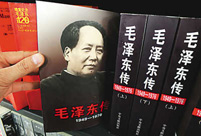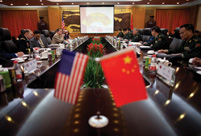 'Jin' named the word of the year by cross-strait netizens
'Jin' named the word of the year by cross-strait netizens Chinese scientific expedition goes to build new Antarctica station
Chinese scientific expedition goes to build new Antarctica station
 Chinese naval escort fleet conducts replenishment in Indian Ocean
Chinese naval escort fleet conducts replenishment in Indian Ocean 17th joint patrol of Mekong River to start
17th joint patrol of Mekong River to start China's moon rover, lander photograph each other
China's moon rover, lander photograph each other Teaming up against polluters
Teaming up against polluters
Long road ahead
Meanwhile, "30 years of development is still short term for the foreign ministry spokesperson mechanism, which means improvement can be made," Jia said. He also noted that there is huge room for spokespersons themselves to make progress.
"Further understanding of national policies and the use of comprehensible language to interpret them are still the issues for spokespersons to work on. It is also important for them to know how much they can talk about," said Jia.
In interpreting foreign policy, taking public concern into consideration is a factor for the spokespersons and their teams to think about in the future, he added.
Spokespersons represent the national attitude. "A simple declaration probably means a change to background policies," said Zhou. China's spokesperson mechanism needs more time to develop public recognition.
As Noriaki Tomisaka from TV Asahi told Global Times, unofficial communications are also important as an information exchange channel. "Certain press conferences are off the record in Japan, which means the information cannot be exposed or reported, but useful information and background knowledge can be received by journalists, which can promote mutual understanding," said Noriaki.
History speaks
Dating back over 30 years, on March 1, 1983, then director of the Ministry of Foreign Affairs Information Department Qi Huaiyuan hosted a press conference in Beijing International Club, announcing the establishment of the ministry's spokesperson mechanism.
The ministry became the first government department in China to establish the mechanism and hold regular press conferences.
On March 26, 1982, in responding to a speech given by Soviet Union leader Leonid Brezhnev, Qian Qichen, then director of the foreign ministry's information department, gave a three-sentence announcement, rebuffing Brezhnev's criticism of China:
"We have noticed the speech on the Sino-Soviet Union relationship delivered by Chairman Brezhnev on March 24 in Tashkent. We firmly reject the attack toward China in the speech. As to the Sino-Soviet Union relationship and international affairs, we emphasize the practical action taken by the Soviet Union."
That announcement, which won enormous international attention, created the possibility to build the spokesperson mechanism.
At first, the ministry held press conferences once a week to make announcements without taking any questions. Since September 1983, journalists could raise questions to the spokesperson on the first week of every month and the rate doubled from 1986. In 1988, journalists could ask questions at every press conference and in 1997, restrictions on the number and length of questions were lifted. Today, the ministry holds a press conference every workday.
"The urge for mutual understanding between China and the rest of the world is the driving source for promoting the spokesperson mechanism," said an official from the spokespersons team when reached by the Global Times.

 Commemorate 120th birth anniversary of Mao Zedong
Commemorate 120th birth anniversary of Mao Zedong Female soldiers of PLA Marine Corps in training
Female soldiers of PLA Marine Corps in training Chinese cities to have a very grey Christmas as smog persists
Chinese cities to have a very grey Christmas as smog persists China and U.S. - the national image in each other’s eyes
China and U.S. - the national image in each other’s eyes The Liaoning's combat capability tested in sea trial
The Liaoning's combat capability tested in sea trial Chinese pole dancing team show their moves in snow
Chinese pole dancing team show their moves in snow Rime scenery in Mount Huangshan
Rime scenery in Mount Huangshan Ronnie O'Sullivan: My children mean the world to me
Ronnie O'Sullivan: My children mean the world to me Shopping in Hong Kong: a different picture
Shopping in Hong Kong: a different picture Yearender: Animals' life in 2013
Yearender: Animals' life in 2013 Hello 2014 - Chinese greet the New Year
Hello 2014 - Chinese greet the New Year Chocolate 'Terracotta Warriors' appear
Chocolate 'Terracotta Warriors' appear  Top 10 domestic news of 2013
Top 10 domestic news of 2013 Red crabs begin annual migrations in Australia
Red crabs begin annual migrations in Australia Artifacts retrieved from West Zhou Dynasty
Artifacts retrieved from West Zhou DynastyDay|Week|Month